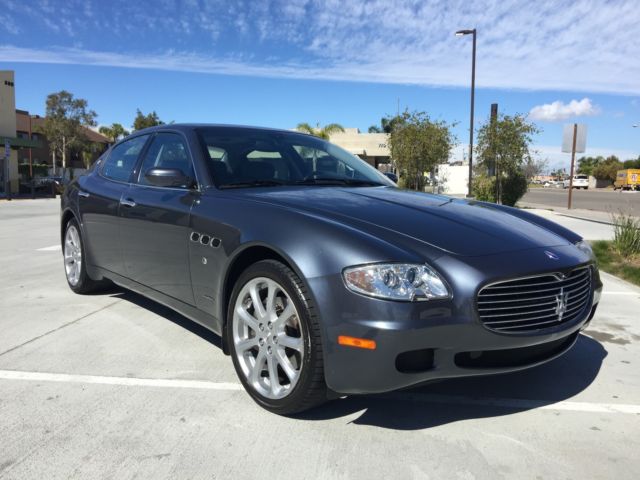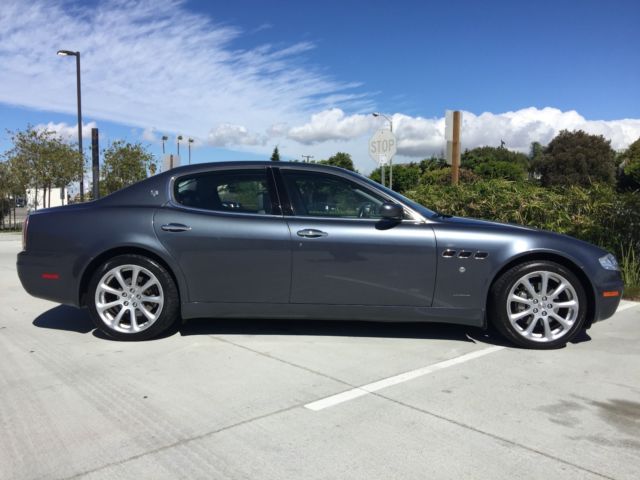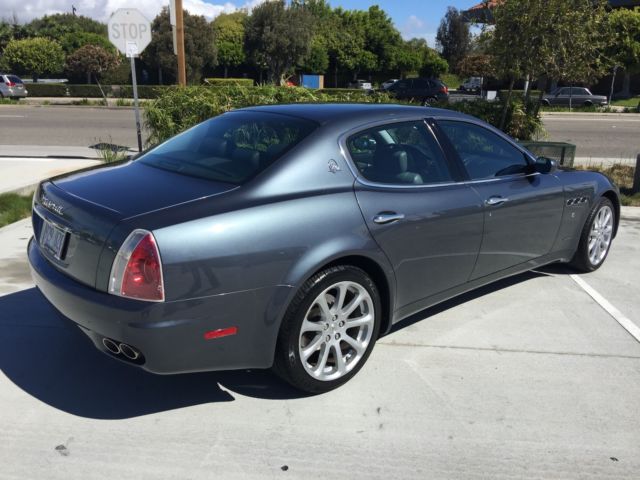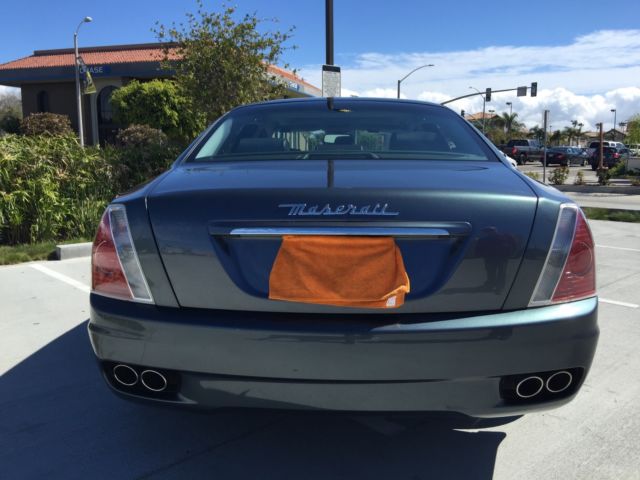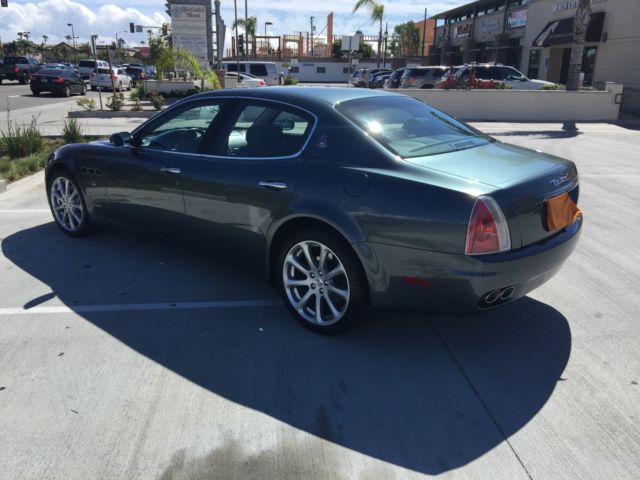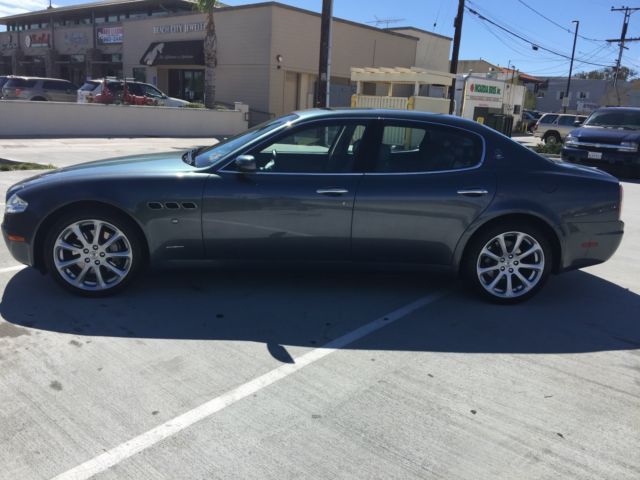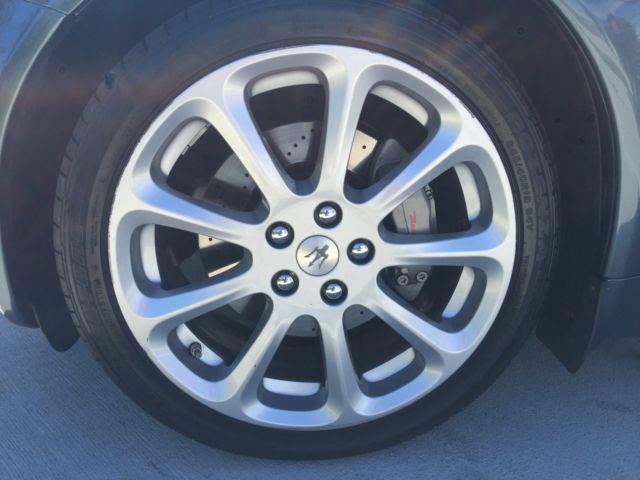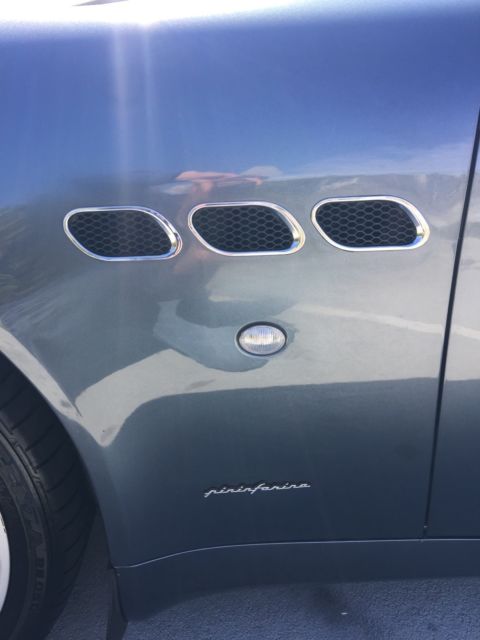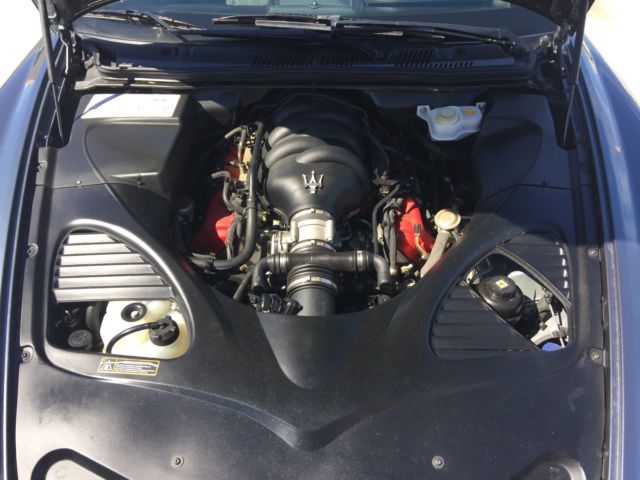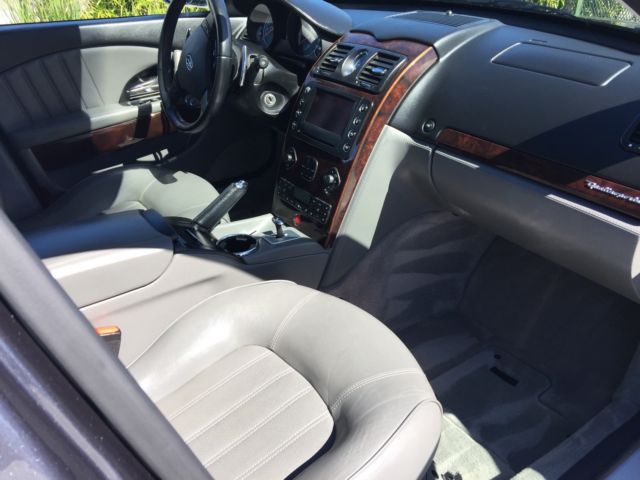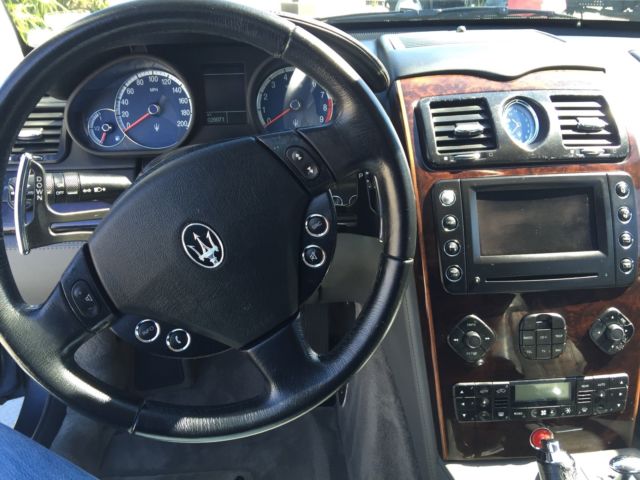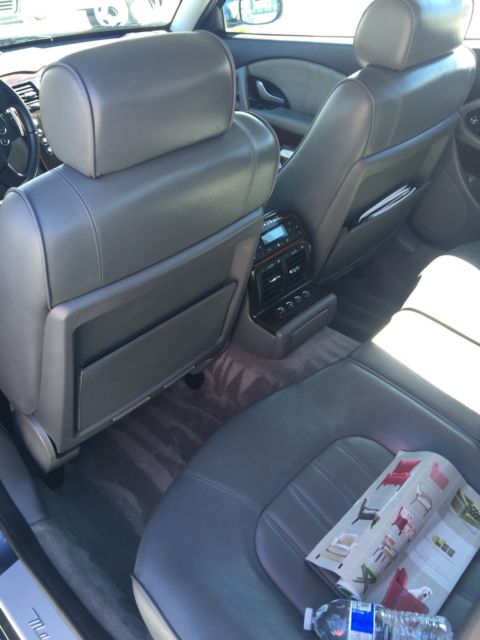Pristine 2005 Grey Maserati Quattroporte Sedan,1 owner, 26500 MILES!
- Condition: Used
- Make: Maserati
- Model: Quattroporte
- Type: Sedan
- Trim: LEATHER
- Year: 2005
- Mileage: 26,500
- VIN: ZAMCE39A850020091
- Color: Gray
- Engine size: V8
- Number of cylinders: 8
- Power options: Air Conditioning, Cruise Control, Power Locks, Power Windows, Power Seats
- Fuel: Gasoline
- Transmission: Automatic
- Drive type: RWD
- Interior color: Gray
- Safety options: Driver Airbag, Passenger Airbag, Side Airbags
- Options: Sunroof
- Vehicle Title: Clear
- Interested?
2005 Maserati Quattroporte Description
“Maserati,” fun to say and a rarity out on the roadwithtop-shelf performance.Styled by Italy's Pininfarina, the fifth-generation Quattroporte reeks of presence, individuality, classy conservatism and drive me desirability.The 2005Maserati Quattroporte Sedan isLOADED, has LOW MILES, 400HP and is in GREAT CONDITION
This car was babied, maintained and ready for you. Located in California with Oregon state plates. Desirable Grigio (dark grey) exterior with Grigio (grey) interior.
The car is fully loaded, only driven for special occasions with very low miles.
No accidents.
$25000
Questions 562-985-3140
Specifications
VEHICLE TYPE:front-engine, rear-wheel-drive, 5-passenger, 4-door sedan
ESTIMATED BASE PRICE:$105,000
ENGINE TYPE:DOHC 32-valve V-8, aluminum block and heads, port fuel injection
DISPLACEMENT:259 cu in, 4244cc
Power (SAE net):394 bhp @ 7000 rpm
Torque (SAE net):333 lb-ft @ 4500 rpm
TRANSMISSION:6-speed manual with automated shifting and clutch.
DIMENSIONS:
Wheelbase:120.6 inLength:198.9 in
Width:74.6 in
Height:56.6 in
Curb weight:4250 lb
PERFORMANCE RATINGS (MFR'S EST):
Zero to 62 mph: 5.2 sec
Top speed (drag limited): 171 mph
Car and Driver Review
Unique car that rivalsfor theAudi A8andS8,Jaguar XJR, MercedesE55andS55, andBMW 745i. With the four-cam V-8 located behind the front axle, the car looks big from the side. The 120.6-inch wheelbase (0.9 inch shorter than an S-class's) and extended doors are clearly evident. Parent company Ferrari located the engine aft of the front axle to create a 47/53 front-to-rear weight distribution, like the 2005Ferrari 612 Scaglietti.
The Maser's driving complexity begins with the fixed door handles. Behind each are two buttons. Touch the gray one, and it releases the door electrically; the black one, requiring more pressure, does the job manually, perhaps in case the electrics go fizz. The cabin is Italianate-tasteful, chic-with all the luxury toys. There's a vast array of materials: rosewood, mahogany, or briarwood, or a titanium finish; 10 Poltrona Frau leathers using 13 stitching colors, 10 on the dash; and 15 exterior colors.
The power seats are as comfortable as they appear sporting. Rear-seat space is more E- than S-class, very relaxing for two. But that's not where we want to be. The nearly vertical steering wheel is adjustable for reach and height. Rather than go the infamous iDrive route, the Italians prefer dedicated dashboard buttons for the stereo, trip computer, telephone, dashboard monitor, and nav system.
Turn the key, and there's a moment's delay, followed by a long whirring sound from the starter before the V-8 fires with an automatic blip of the throttle. The transmission (there's no clutch pedal; it's a robotic manual with automated shifting and clutch) defaults to the automatic-shift mode. Select drive, press the accelerator, and go. Called Cambiocorsa in the Coupé and DuoSelect in the Quattroporte, it's the only transmission choice. On a light throttle, gearshifts are smoother than in the Coupé and almost as fluent as a conventional automatic. But as you add power, the shifting action becomes increasingly hesitant, and full-throttle shifts at the 7500-rpm redline are downright abrupt.
Flick a switch to engage manual mode, and gearchanging is done via paddles behind the steering wheel-left for downshifts, right for upshifts. There's more complexity: The "Sport" button on the steering wheel firms up the electronic dampers and quickens gearchanges-and it stays in gear, even as the engine hits its rev limiter, instead of upshifting. Learn to feather the throttle at each upward gearchange, and progress is smoother. The gearbox is slow from drive to reverse and back again. We can't help wondering how the Quattroporte would behave if it worked through a traditional torque converter and six-speed automatic.
The 4.2-liter V-8's a belter. Maserati claims marginally more power here than in the Coupé or Spyder (394 horsepower versus 385) but the same 333 pound-feet of torque. Still, a new air filter, revised camshaft profiles, a modified engine-control map, and a new exhaust system have flattened the torque curve at low revs. No matter where you are on the rev counter, the engine never makes less than 221 pound-feet of twist.
These four-doors go from 0 to 62 mph in 5.2 seconds, according to the factory. The soundtrack is a rising crescendo of induction and exhaust music across the entire rev range. Top speed is 171 mph, Maserati says. Powerful though it is, the V-8 blends this stirring performance with terrific flexibility and refinement. Yet the combination of a weight of about 4250 pounds and plenty of revs results in extreme fuel consumption: 9 mpg on Europe's city cycle.
The sports-car weight distribution, the new unequal-length control-arm suspension, and the mounting of the electrically assisted steering rack in front of the axle line are intended to endow the Quattroporte with exceptional agility. It failed to meet expectations. The car is clearly most comfortable on fast, open roads. There it feels settled, poised, and responsive. In tighter second-and-third-gear country, the steering feels comparatively slow, with 3.1 turns lock-to-lock. The leisurely turn-in worsens the mild understeer, but the speed-variable weighting is just right, with enough communication for the driver to feel a part of the action.
There's also plenty of grip, at least in the dry, and the car feels smaller and lighter than the specs suggest. One theoretical advantage of the rearward weight bias is improved traction, but despite massive rubber-285/40ZR-18 tires at the rear-motoring over wet tarmac requires care, especially if you're brave enough to disengage the stability-control system.
The electronically controlled suspension is Maserati's second-generation Skyhook system. It adds throttle and steering angles to its range of senses. These help the suspension read road conditions and driver mood for the fast-adjusting shock absorbers to work out the best possible setting. The ride is always firm. Low-frequency wallows and road crowns are soaked up, but overall the ride quality is patchy. The suspension copes well with larger bumps and longitudinal ridges but lacks the ability to damp out small, sharp bumps. The big car sometimes feels skittish over transverse imperfections, such as railroad tracks.
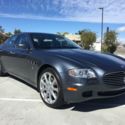 2005 Maserati Quattroporte 26500 MILES!
2005 Maserati Quattroporte 26500 MILES!
Mileage: 26,500
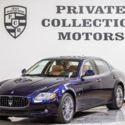 2011 Maserati Quattroporte 1 Owner Clean Carfax Low Miles Pristine
2011 Maserati Quattroporte 1 Owner Clean Carfax Low Miles Pristine
Mileage: 20,367
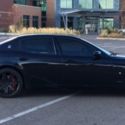 2008 Maserati Quattroporte GTS - Pristine, Two Owner Car
2008 Maserati Quattroporte GTS - Pristine, Two Owner Car
Mileage: 28,800
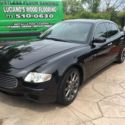 ~ ONLY 41K miles! ~ 2005 Maserati Quattroporte Base Sedan 4-Door 4.2L
~ ONLY 41K miles! ~ 2005 Maserati Quattroporte Base Sedan 4-Door 4.2L
Mileage: 41,000
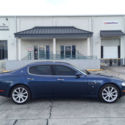 2005 Maserati Quattroporte Sedan 4-Door 4.2L Low Miles Salvage Rebuildable
2005 Maserati Quattroporte Sedan 4-Door 4.2L Low Miles Salvage Rebuildable
Mileage: 30,020
 2005 Maserati Quattroporte 78347 Miles Blue Nettuno Metallic Sedan 4.2L DOHC MP
2005 Maserati Quattroporte 78347 Miles Blue Nettuno Metallic Sedan 4.2L DOHC MP
Mileage: 78,347
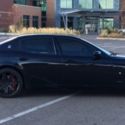 2008 Maserati Quattroporte GTS - Pristine
2008 Maserati Quattroporte GTS - Pristine
Mileage: 28,800
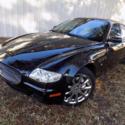 2005 Maserati Quattroporte 66K One Owner CARFAX Guarantee AutoStick No RESERVE
2005 Maserati Quattroporte 66K One Owner CARFAX Guarantee AutoStick No RESERVE
Mileage: 66,810
 2005 Maserati Quattroporte Base Sedan 4-Door 4.2L
2005 Maserati Quattroporte Base Sedan 4-Door 4.2L
Mileage: 40,502
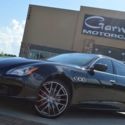 2014 MASERATI QUATTROPORTE S Q4 * $114K NEW * V6 * PRISTINE CONDITION! MK OFFER
2014 MASERATI QUATTROPORTE S Q4 * $114K NEW * V6 * PRISTINE CONDITION! MK OFFER
Mileage: 10,158
